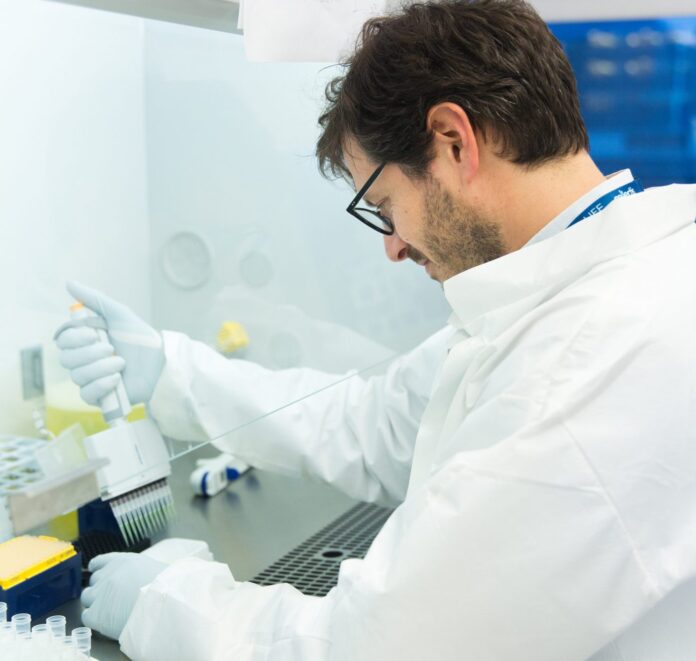
Researchers from Cellectis published a proof-of-concept study detailing the activity of “smart” T-cells capable of sensing and reacting to tumors with micro secretions of therapeutic proteins that improve their ability to fight cancerous cells, potentially paving the way for a next generation of tightly-controlled, highly active—and potentially safer—CAR T-cell treatments.
By using gene editing—notably Cellectis’ proprietary TALEN® technology—to rewire the TCRα, CD25 and PD1 genes along the TCR activation pathway, the company said, CAR T-cells were able to reshape the tumor microenvironment by micro secreting the pro-inflammatory cytokine Interleukin 12 (IL-12) in a tumor- and time-dependent manner.
“This agent (IL-12) is known to increase T-cell cytolytic functions, enhance their persistence, remodel the tumor microenvironment, and recruit additional endogenous immune effectors that improve the therapeutic outcome,” Julien Valton, PhD, Innovation Team Leader, Cellular Engineering & Adoptive CAR T-Cell Immunotherapy, Cellectis, told GEN.
However, while IL-12 is a very powerful anticancer agent, it has pleiotropic effects and its systemic infusion in patient is highly toxic. As a result, Valton noted, the immunostimulatory agent must be precisely delivered at the tumor site at an appropriate dose to prevent potential toxic side effects—while avoiding the toxicity of a systemic injection of IL-12.
“Our engineering strategy was designed to prevent such toxic side effects by generating intelligent CAR T-cells capable of secreting IL-12 in a local and tumor-dependent manner. This new generation of CAR T-cells can sense the amount of neighboring tumor cells and secrete IL-12 accordingly,” Valton added.
By sensing and remodeling their microenvironment in a tailored, highly regulated, and antigen-specific manner, the smart CAR T-cells pose a reduced risk of general secretion in healthy tissues, advancing safety, according to Cellectis.
Valton and colleagues detailed their in “Repurposing Endogenous Immune Pathways to Tailor and Control Chimeric Antigen Receptor T-cell Functionality,” a study published in Nature Communications.
Cellectis’ TALEN technology was used to cleave TCR and PD1 genes and insert the coding sequence of CAR and IL-12 at the two cleavage sites, respectively. The TCR TALEN was designed to cleave the first codon of the constant region of the TCR alpha chain, while the PD1 TALEN was designed to cleave the second exon of the PDCD1 gene.
“Two DNA donor templates were designed to insert the coding sequences of the CAR and IL-12 in frame with the coding frames of TCR and PDCD1 genes respectively,” Valton explained. “The co-treatment of T-cell by both TALEN and DNA repair templates resulted in the inactivation of TCR and PD1 and in the seamless insertion of CAR and IL-12 open reading frames at their intended sites.”
Because PD1 is part of the TCR activation pathway, PD1 is tightly up- and downregulated when TCR engages a peptide MHC complex.
Cellectis’ engineering strategy rewired the TCR regulatory pathway to secrete IL-12 when the CAR engaged a tumor target, Valton said. “Our approach enables a generation of T-cells lacking TCR and PD1, and endowed with CAR expression to be capable of secreting IL-12 in a tumor-dependent manner.”
“Because our engineering strategy is modular, it could be also used to secrete a myriad of different clinical grade therapeutic proteins—other immunostimulatory agents including IL-15, IL-18, PD1 checkpoint inhibitors, etcetera—to adapt to the environment in different conditions and for different indications to fight cancer,” Valton added. “This proof-of-concept also paves the way for numerous therapeutic combinations to be explored, and could bring smarter, safer, and more effective treatments to the forefront.”
Headquartered in Paris, with additional locations in New York and Raleigh, NC, Cellectis’ lead immuno-oncology product candidates are UCARTs (Universal Chimeric Antigen Receptor T-cells), allogeneic CAR T-cell treatments designed to target a selected tumor antigen and bear specific engineered attributes, such as compatibility with specific medical regimens that cancer patients may undergo. Heading Cellectis’ UCART pipeline is UCART19, which has been exclusively licensed to Servier, was initially developed for relapsed/refractory acute lymphoblastic leukemia (ALL), and uses TALEN technology.
Servier in turn has exclusively licensed U.S. rights for UCART19 to Allogene Therapeutics, while retaining exclusive rights for all other countries. Under the name ALLO-501, Allogene is overseeing development of the CAR T-cell candidate in relapsed/refractory non-Hodgkin lymphoma (NHL).
Cellectis’ TALEN technology is based on a class of proteins derived from transcription activator-like effectors (TALEs), highly-specific DNA-binding proteins featuring an array of 33- or 34-amino acid repeats. Each repeat is highly conserved, with the exception of the repeat variable di-residues (RVDs) at amino acid positions 12 and 13. The RVDs determine the DNA sequence to which a TALE will bind. The resulting one-to-one correspondence between TALE repeats and the corresponding DNA sequence is designed to enable a straightforward process for assembling repeat arrays to recognize novel DNA sequences.
TALEs can be fused to the catalytic domain from a DNA nuclease, FokI, to generate a transcription activator-like effector nuclease or TALEN construct designed to combine high specificity and activity, effectively generating engineered sequence-specific nucleases that bind and cleave DNA sequences only at pre-selected sites. TALEN products are designed by fusing the DNA cutting domain of a nuclease to TALE domains, which can be tailored to specifically recognize a unique DNA sequence. According to Cellectis, these fusion proteins serve as readily targetable “DNA scissors” for gene editing applications that enable users to carry out targeted genome modifications such as sequence insertion, deletion, repair, and replacement in living cells.

